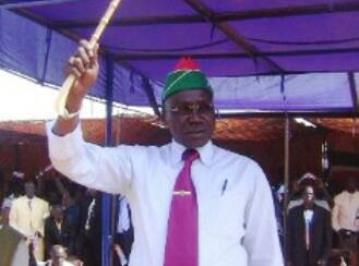Russia, Angola block UN sanction on S. Sudan’s Malong and Olony, as NGOs condemn
September 15, 2015 (NEW YORK) – International human rights groups have condemned the action by Russia and Angola which blocked a draft proposal by the United Nations Security Council (UNSC) to impose targeted sanctions on South Sudanese military from the two warring parties.

The US-drafted sanctions tabled before the Security Council on Tuesday urged to impose a global travel ban and assets freeze on the two senior rival army commanders in a series of other targeted sanctions expected to follow against individual political and military leaders in South Sudan.
While 13 out of the 15 members of the UN Security Council were in favour of imposing the sanctions, Russia and Angola blocked the document, citing more time to further study it.
South Sudanese foreign minister was last week in Moscow where he urged Russia together with his Sudanese counterpart to oppose any sanctions on his government.
In a joint statement to the United Nations issued on Tuesday, Enough Project, Human Rights Watch and Amnesty International condemned the move by the two communist nations, saying individuals who have committed crimes under international law and serious violations of human rights in South Sudan should not be spared.
The trio called on the United Nations to also impose a “comprehensive” arms embargo on South Sudan in order to limit their capacity to fight without incoming weapons and ammunitions and therefore frustrate their quest for more violence and war.
“As you know, although South Sudan’s President Salva Kiir and armed opposition leader Dr. Riek Machar signed a binding agreement to end the conflict in their country, fighting has continued in Unity and Upper Nile states. As our organizations have documented in detail, the 21-month conflict in South Sudan has been characterized by war crimes and other acts that may also amount to crimes against humanity, and it has clearly been fuelled by impunity,” partly reads the statement.
“Given the high probability of continuing serious abuses against civilians as part of the ongoing fighting, we urge you to impose a comprehensive arms embargo,” it says.
They stressed the importance of punishing those responsible for human rights abuses and war crimes in South Sudan so as to enforce accountability and avoid impunity.
“It is imperative that continued human rights abuses and ceasefire violations in South Sudan be met with real consequences from the international community. Decisions are being made on both the government and rebel side to undermine the implementation of the peace deal. If there is no cost for that intransigence and for the human rights crimes that result, then we can expect the war to continue, business as usual,” warned John Prendergast, founding director of the Enough Project.
Analysts however say the blocking of the draft by Russia and Angola may not be the end of the story as other 13 members of the Council will keep pushing for its final endorsement, or individual countries such as US, UK, China, France, Germany, etc., and organizations such as the European Union, etc., who have more diplomatic leverage and international influence than Russia may unilaterally impose the sanctions on the two commanders.
Since the conflict began in December 2013, fighting and abuses have forced over 2 million people to flee their homes and thousands of civilians have been killed, often targeted because of their ethnicity or perceived political allegiance.
“The likelihood of further attacks on civilians in South Sudan remains high. A well-monitored arms embargo can reduce the flow and entry of weapons and military equipment into the country that could be used to commit further crimes against civilians,” recommends the statement.
(ST)
